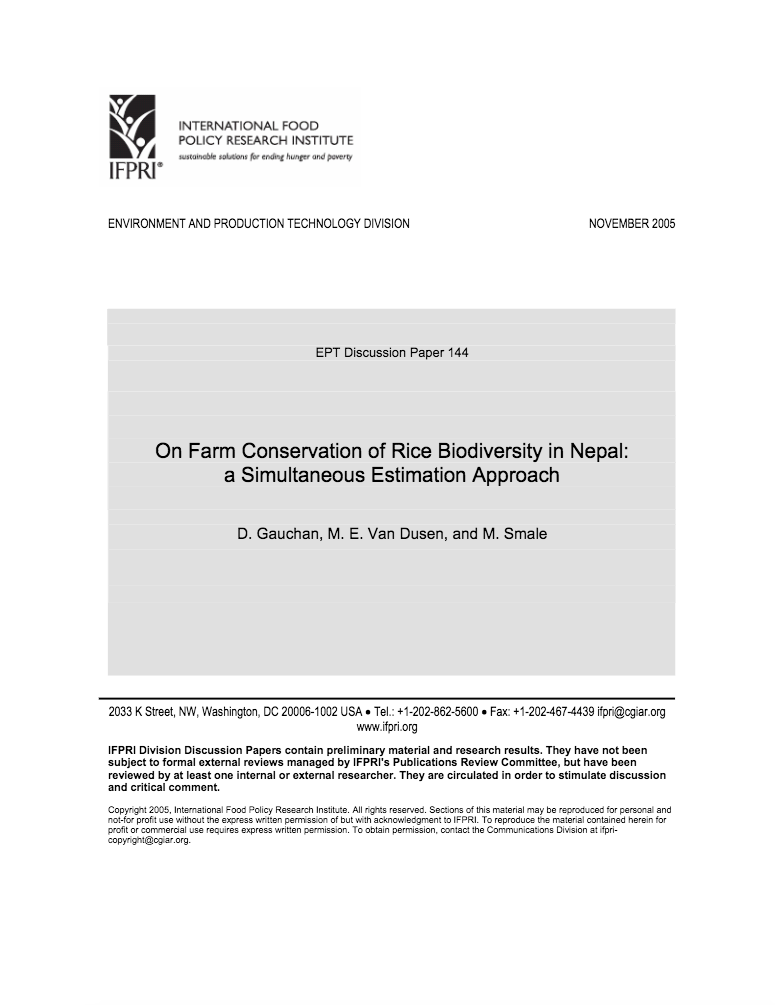Focal point
Location
About IFPRI
The International Food Policy Research Institute (IFPRI) provides research-based policy solutions to sustainably reduce poverty and end hunger and malnutrition in developing countries. Established in 1975, IFPRI currently has more than 500 employees working in over 50 countries. It is a research center of theCGIAR Consortium, a worldwide partnership engaged in agricultural research for development.
Vision and Mission
IFPRI’s vision is a world free of hunger and malnutrition. Its mission is to provide research-based policy solutions that sustainably reduce poverty and end hunger and malnutrition.
What We Do
Research at IFPRI focuses on six strategic areas:
- Ensuring Sustainable Food Production: IFPRI’s research analyzes options for policies, institutions, innovations, and technologies that can advance sustainable food production in a context of resource scarcity, threats to biodiversity, and climate change. READ MORE
- Promoting Healthy Food Systems: IFPRI examines how to improve diet quality and nutrition for the poor, focusing particularly on women and children, and works to create synergies among the three vital components of the food system: agriculture, health, and nutrition. READ MORE
- Improving Markets and Trade: IFPRI’s research focuses on strengthening markets and correcting market failures to enhance the benefits from market participation for small-scale farmers. READ MORE
- Transforming Agriculture: The aim of IFPRI’s research in this area is to improve development strategies to ensure broad-based rural growth and to accelerate the transformation from low-income, rural, agriculture-based economies to high-income, more urbanized, and industrial service-based ones. READ MORE
- Building Resilience: IFPRI’s research explores the causes and impacts of environmental, political, and economic shocks that can affect food security, nutrition, health, and well-being and evaluates interventions designed to enhance resilience at various levels. READ MORE
- Strengthening Institutions and Governance: IFPRI’s research on institutions centers on collective action in management of natural resources and farmer organizations. Its governance-focused research examines the political economy of agricultural policymaking, the degree of state capacity and political will required for achieving economic transformation, and the impacts of different governance arrangements.
Research on gender cuts across all six areas, because understanding the relationships between women and men can illuminate the pathway to sustainable and inclusive economic development.
IFPRI also leads two CGIAR Research Programs (CRPs): Policies, Institutions, and Markets (PIM) andAgriculture for Nutrition and Health (A4NH).
Beyond research, IFPRI’s work includes partnerships, communications, and capacity strengthening. The Institute collaborates with development implementers, public institutions, the private sector, farmers’ organizations, and other partners around the world.
Resources
Displaying 1056 - 1060 of 1521Indian agriculture and rural development
In this brief, the authors suggest five areas for action to put rural India on a higher growth trajectory that would cut hunger, malnutrition, and unemployment at a much faster pace than has been the case so far. The five areas for action are interlinked and would best work if pursued in conjunction. The authors emphasize investments with a human face that include and reach out to the rural poor and a reorientation of subsidies toward such investments: 1.
On farm conservation of rice biodiversity in Nepal: a simultaneous estimation approach
"This paper presents an empirical case study about farmer management of rice genetic resources in two communities of Nepal, drawing on interdisciplinary, participatory research that involved farmers, rice geneticists, and social scientists. The decision-making process of farm households is modeled and estimated in order to provide information for the design of community-based conservation programs.
Societal responses for addressing nitrogen fertilizer needs: Balancing food production and environmental concerns
Strategies for sustainable land management and poverty reduction in Uganda
The government of Uganda, with help from its development partners, is designing and implementing policies and strategies to address poverty, land degradation, and declining agricultural productivity. Land degradation, especially soil erosion and depletion of soil nutrients, is widespread in Uganda and contributes to declining productivity, which in turn increases poverty.
Development pathways and land management in Uganda
This paper investigates the patterns and determinants of change in income strategies ("development pathways"), land management, resource and human welfare conditions in Uganda since 1990, based upon a community-level survey conducted in 107 villages. Six dominant development pathways were found, all but one of which involved increasing specialization in already dominant activities. Of these, expansion of banana and coffee production was most associated with adoption of resource-conserving practices and improvements in resource conditions and welfare.







